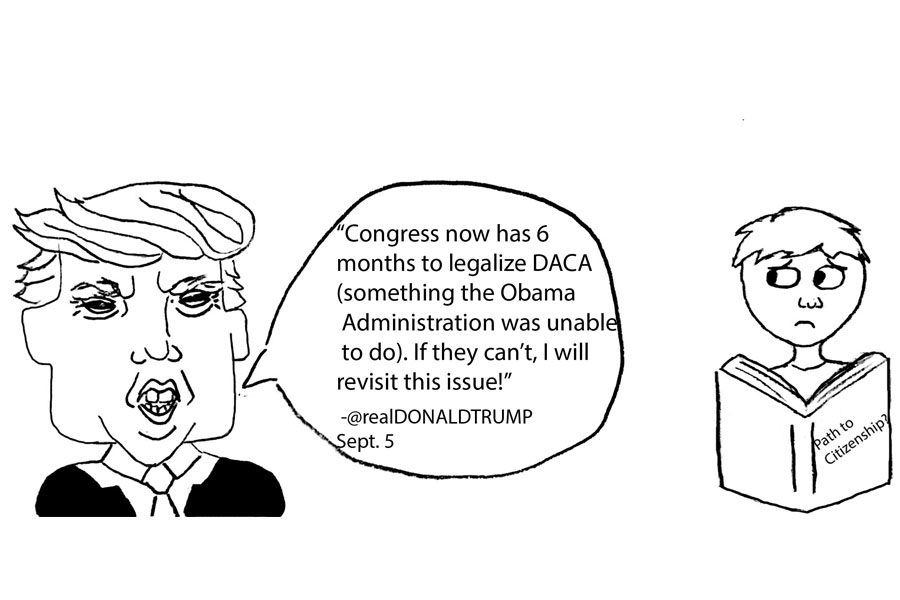Trump Chooses to End DACA
October 26, 2017
President Donald Trump’s plan to end former President Barack Obama’s Dream Act program, Deferred Action for Childhood Arrivals (DACA), will cause irreparable damage to up to hundreds of thousands of undocumented families across the country if Congress fails to pass a revised version within six months.
DACA is a program that, according to UC Berkeley’s information site on undocumented immigrants, protects undocumented minors who were brought to the U.S. as children by shielding them from deportation and providing them with a work permit. While the president has not announced clear plans to dismantle the program and what, if anything, will replace it, he has illustrated his minimal grasp of the program and immigration as an issue by announcing his ban in an unprofessional, irresponsible and unofficial way: his Twitter feed.
President Trump has further revealed his unwillingness to tackle this complicated policy by disregarding the importance of Congress passing an updated Dream Act, which would provide a pathway to citizenship and permanent protection to unauthorized immigrants who came to the country as children. Instead Trump stands idly by waiting for the six months to pass, so that he doesn’t have to actually deal with the problem.
But why demolish something that helps so many people? What is he going to gain from deporting innocent hardworking people, who are a major part of the U.S. economy?
“Deporting doesn’t help us have more educated members of our society that can work and improve our economic functioning,” social studies teacher Rene Shuler said. “We have to show that education is important to help grow businesses.”
Ending DACA will result in hundreds of thousands of people losing their work authorization and therefore being forced out of the labor market, which according to the Center for American Progress (CAP), will ultimately cost the country billions of dollars. Dismantling DACA would eradicate more than $433.4 billion from the U.S. Gross Domestic Product (GDP) over just 10 years in addition to putting over 741,000 DACA recipients at risk of deportation.
Trump continues to call himself a businessman, but his ban of DACA will cause the country to lose too many workers and too much money, affecting countless businesses nationwide. What good businessman lets his company lose that much money, let alone encourages it?
“My hope is that [Trump] will find a way to phase people in, or to somehow acknowledge the people who have been here and are clearly working hard,” Shuler said.
“They’re not truant or getting in trouble, they’re invested in school and they’re demonstrating that by going to college working towards a degree, because that all benefits our country at the end of the day.”
CAP reports that in Maryland alone, there are approximately 9,000 DACA recipients, which would result in a loss of $480.6 million annually.
Maryland has joined 14 other states and D.C. in suing the Trump administration over ending the Obama-era program, and five counties in Maryland — including Montgomery County — joined together to write a letter, saying that ending DACA would have “direct and damaging effects” on Maryland students.
“The issue really becomes that they’re not paying taxes into the [public] school systems, and that’s why it is more money, a lot of it is the cost for education if you’re not paying into the system,” Shuler said.
There are significant economic benefits to passing DACA. The CAP did a study which found that passing the Dream Act and placing all of the potentially immediately eligible workers on a path to legal status would add a total of $22.7 billion annually to the U.S. GDP, and because the gains from passing DACA grow each year, the GDP would cumulatively increase by $281 billion over 10 years.
If the entire population (including those who will one day become eligible) is considered, the economic gains could be roughly 40 percent higher, meaning over 10 years the annual GDP gain would be roughly $400 billion.
Trump claims he wants to “Make America Great Again,” but by ending DACA he is forcing people out of the country whose only hope is to make this country and their lives better. If Congress does not pass DACA, people will begin losing their protections as soon as March 5 and the program is no longer accepting applications as of Oct. 5.
Citizens, including students, need to speak up just as Maryland and Montgomery County have and take action by contacting local and national representatives, and urging them to protect the hundreds of thousands of families and workers we call our neighbors and friends.
For the next six months, DACA recipients everywhere will live every day under crushing uncertainty. If by then Congress has not passed the bill, DACA recipients — one by one — will face an impossible choice: They can surrender to the lives they escaped five years ago, hoping what were likely unbearable conditions in their native country have suddenly changed or they can try to find a more tolerant and welcoming place to live.




